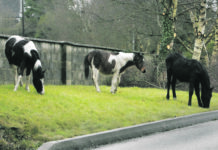
THE Limerick Cycling Campaign, the Limerick Cycle Bus, and the Limerick Pedestrian Network have come together to highlight that safety must come first in a crucial upcoming Council vote to introduce a 30km/h speed limit in the city centre.
When councillors vote on the introduction of the controversial speed limit for the city at the upcoming full council meeting next Monday (September 25), a change to the by-laws could see the maximum speed a vehicle can be driven at reduced from 50km/h to 30.
Ahead of Monday’s meeting, Limerick campaigners have highlighted the need for reducing speed, insisting it is the single biggest step that can be taken to make roads safer, to protect vulnerable road users, and encourage sustainable and active modes of transport.
“After a summer of tragic road fatalities in urban and rural contexts, including Limerick City where a 14-year-old girl was knocked down and killed by a driver — we need to see safety for our children, older people and all city centre residents and visitors prioritised,” Anne Cronin from Limerick Cycling Campaign told the Limerick Post.
“Currently our roads and streets are not safe. People contact our campaign groups regularly highlighting incidents where they have narrowly escaped injury, whether by close pass while cycling, drivers speeding through junctions, or rushing through built up areas as parents try to escort children safely to school.”
According to Madeleine Lyes of Limerick Pedestrian Network, Monday’s Council vote is an opportunity for Limerick to send a message that the city centre should be a safer place for everyone.
“The evidence is clear, lower speeds mean fewer casualties. A five per cent reduction in speed means a 30 per cent reduction in fatal collisions,” she explained.
Conor Buckey from the Limerick Cycle Bus pointed out that there are already many examples of the success for cities imposing a 30km/h limit.
“A study from London found that lower speed limits (in this case 20m/ph zones) were associated with a 42 per cent reduction in road casualties, while in Bristol the introduction of 20m/ph limits was associated with a 63 per cent reduction in fatal injuries between 2008 and 2016.”
This original Council vote on this issue was meant to take place in July, however a vote was deferred seeking further clarification and time for councillors to consider the motion further.
“It is worth remembering that since then a child was killed on one of the streets earmarked to see a speed reduction,” Ms Cronin concluded.










